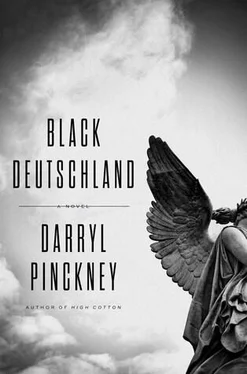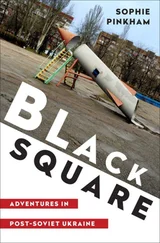I’d hung out in the ChiChi since my first trip to West Berlin. My fourth night there I let myself be picked up by a nice French girl and the night after that I successfully chatted up a boy from a small West German town. I’d shaken off the sour-smelling old man with his fake Ballets Russes act. The bar’s owners, Zippi and Odell, tore up my tab for the night my last night in town. In the years following, the first thing I’d do when I got back to town was head to Europa Center. No matter what I got up to in between, I ended my holidays licking my wounds at the ChiChi. I sent Zippi and Odell amusing postcards.
There was a traditional high culture that Cello and Dram lived in and there was an alternative high culture that I was about to go to work in, but the Berlin I lived in with my soul was around the train station and the porn theaters, the cheap lights and fried-food stalls. There were also loud beer bars and serious bookstores tucked under the S-Bahn tracks. I felt at home in a bad bar that did very well. Maybe the ChiChi had been “in” in the ’70s. It was listed as a gay bar in out-of-date guides, although anybody and everybody could be found there. White women scored with the black men more than the white men did. I perhaps wrongly assumed that things went on between the black men, American and African, but not counting Odell’s buddies. It hardly mattered, because the real business of everyone there was to drink.
Addiction insulated the bar against fashion. There was a group of regulars who’d put in much bar time together. They were the audience for the life-changing mistakes that the ChiChi specialized in. It was a place where people experiencing a bad night strayed in to finish things off with meltdowns, blackouts, fistfights, seizures. Sex was just the messy afterthought, something to do when daylight hit.
“What time do you close here?” I asked Zippi my first night at the ChiChi.
She lifted her head from the bar. “We are never closed here.”
In all of my walks when first back in Berlin as a recovering alcoholic, I never let myself go to Europa Center. If I got out at Zoo Station, I took a long, roundabout way to Cello’s apartment, just to avoid going by the old smells and sights. Avoid people, places, and things, I wanted someone to say at my AA meeting in Dahlem, because I’d yet to open my mouth in that meeting. Back up in the center of town, I’d walk with my final cigarette of the day and look down the Ku’damm toward the bright intersection and the street that led up to the train station. I could feel my steps continuing. I always loved the sound of my footsteps in Berlin. The Negro in Europe.
And I knew they’d be there at the ChiChi. It was never too early for Odell to slap a wet towel on the bar and Zippi to slam the cash register. There was always a fight going on between them; there were always drinks of some kind sitting in front of them. Maybe Big Dash had come in, reeking of Indian spices. I could see them, some of whom I’d groped, quiet because it was early yet, drinking fast, their cigarette packs and fancy lighters on the bar, on their way to not needing to drink as fast, and not one of them thinking of me.
Alcohol wasn’t thinking of me either. You cannot one-up someone who has dumped you, but my former love, white wine, was showing that to be not always the case. I left white wine, yet when I stood there on the Ku’damm, with the sky blue behind me and the east ahead of me end-of-summer dark, it was white wine that was over me already and in the arms of someone else.
The conquest of the earth was not a pretty thing. The splendor and misery were gone. Symbolic, unchaste Berlin was still the barracks town of Frederick the Great, but the once-teeming capital had also become a small town with a big past. You could crawl into the disfigured city as into a shell. You could treat it as either inhabited ruin or blank space. You could write your own ticket, regard the city as backdrop, a theatrical setting, and appropriate the citizens as extras for your daily dramas, your tremendous inner opera buffa.
The wintry light cast a spell. You were going to walk out the door and reinvent yourself. You were going to turn a corner and there in the neon haze would be the agent of your conversion. Or you could go around in a nervous silence for days, as if the city had been depopulated, leaving only an architecture of signs, layer upon layer, and a dialogue between vanished buildings and their replacements. A preserved fragment of the bombed-out-then-mostly-demolished Anhalter train station shot up from the hard earth to scream at a white block from the 1970s that was like the architectural equivalent of a bimbo.
“Paradise is locked and bolted. We have to make the journey around the world to see if it is open at the back,” Kleist said. Berlin hid its historical face until you slipped over there, into East Berlin, into the immensity of Unter den Linden, Apollonian Baroque and the ineptitude of Karl-Marx-Platz. I didn’t try to stop myself from liking the dereliction, the forgotten pockets of buildings still so scarred by bullets that I would not have been surprised had Marlene Dietrich emerged from a doorway to sing “Black Market.” Overdressed, laden with the Communist state’s unconvincing currency, I found the usual racial situation reversed. These white people who spoke low like inhabitants of a ghost town were the primitives, the needy tribesmen I couldn’t take back with me. The sky was a glittering frontier of fumes, creeping mists, and the Berlin Wall itself the white surf.
Back in louder, wandering West Berlin, I turned around and faced the Wall, an exhibition of found art, an explosion of graffiti, like a high school yearbook. I was told that a man was sometimes lowered in a cage from the featureless earth of No Man’s Land to wash away the many-colored scrawls of slogans and hearts. I didn’t believe it, though none of the graffiti went back very far, certainly not as far back as the crosses behind the Reichstag in memory of those killed trying to escape that August of 1961, when the Wall went up overnight.
The Wall made the lucky part of Berlin artificial, held its grumbling, caustic population in the jealous embrace of privilege. It was a poor city, West Berlin. The conquered city had become the subsidized city. Old Germans willing to live in encircled West Berlin received tax breaks and the young were exempt from national service. The real estate was worth nothing and there was no heavy industry to speak of, just the hundreds clocking in at Schuzburg Tools and other family companies like it. The city services were not massive. Workers of the world — clock out and spend four weeks in a spa. The only big business, it seemed, was culture. The students, filmmakers, artists, musicians, actors, writers, and professors were the aristocracy, and a foreigner, an intruder, never had to make sense.
* * *
I longed, as did Cello’s nanny, for those times when the family was out. She and I gravitated to the balconies, in spite of the wet and cold. We went out onto separate balconies. It was understood. Our needs. I smoked. She ate hidden chocolates. Neither of us had had anywhere to go on New Year’s Eve. We said when we met in the kitchen that we were exhausted from the noisy family Christmas and didn’t want to go anywhere anyway. She was paid extra to watch the children that night and Cello approved of my staying quiet.
Valentine’s Day went unmentioned in the kitchen, but not the Ides of March. The nanny said she didn’t give a fig about Shakespeare. All her life she’d been disgusted with the Bard. On her nights off, she’d taken to coming in giggly from a bar frequented by British soldiers. She was getting drunken phone calls after ten o’clock. I knew that Cello would have Dram speak to her before too long. I was not sorry to see her go. She’d been good with the children, which many mothers resent in a nanny after a while. But she wanted to trade confidences with me about Cello, as though she were my equal, or rather as if I were down there with her.
Читать дальше












